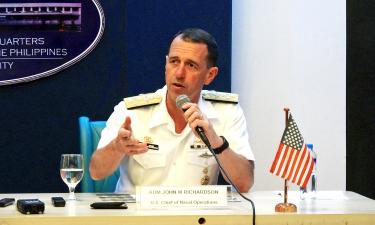The US military will continue to advocate free navigation through international waters, including the Taiwan Strait, a top US Navy official said on Monday.
“Parts of the Taiwan Strait are international waters. They are accessible to all who want to pass through them,” US Chief of Naval Operations Admiral John Richardson said at a press conference at Camp Aguinaldo, Quezon City, Philippines.
“They’re part of the global commons, which is the foundation for free navigation, and so in this area, the United States and the United States Navy will continue to advocate for free navigation through those international waters, where we will operate and sail and fly or enter wherever international law allows,” Richardson said.
The US official’s comments were made in response to a question from Central News Agency on how he sees the current situation in the Taiwan Strait, and what the US military would do to help maintain peace and stability there.
He was non-committal on what operations the US might have planned in the region for the future.
“I think it’s not healthy to speculate on those sorts of things, but you can count on us to be persistent and consistent advocates for freedom of navigation through international waters,” Richardson said.
His pledge came after two US ships, shadowed by Chinese People’s Liberation Army (PLA) warships, sailed through the Taiwan Strait on Monday last week and a Chinese destroyer came dangerously close to a US Navy ship in the disputed South China Sea last month.
The ships’ passage were criticized by China, although its response was relatively muted.
Richardson said the US Navy would continue to communicate with the PLA on the Code for Unplanned Encounters at Sea.
Noting that the Philippines and other ASEAN claimant states are negotiating a code of conduct to govern actions in the disputed area, Richardson said any progress is a move in the right direction, whether the code is legally binding or not.
In related news, President Tsai Ing-wen (蔡英文) yesterday received a delegation from Chinese-American community organization Hop Sing Tong in Taipei.
A stable Taiwan-US relationship is an important foundation for defending democracy, and maintaining peace and stability in the Indo-Pacific region, Tsai told the delegation.
Tsai thanked the overseas Taiwanese community for their warm welcome when she transited through the US on her trip to Paraguay and Belize in August, for being the government’s “backbone” overseas and for consistently supporting the nation through action.
Over the past two years, exchanges between Taiwan and the US have become more frequent and bilateral relations have continued to grow, she said.
CPC Corp, Taiwan (CPC, 台灣中油) is to purchase US$25 billion worth of liquefied natural gas from the US, and Formosa Petrochemical Corp (台塑石化) and Hon Hai Group (鴻海集團) have made investments in Louisiana and Wisconsin respectively, she said.
These partnerships help boost Taiwan-US relations, she said.
Taiwan is not only strengthening its cooperation with countries with similar ideologies, but also striving to transform and upgrade domestic industries, and to attract foreign investment, Tsai said.
Additional reporting by Sherry Hsiao
Source: Taipei Times - 2018/10/31





















